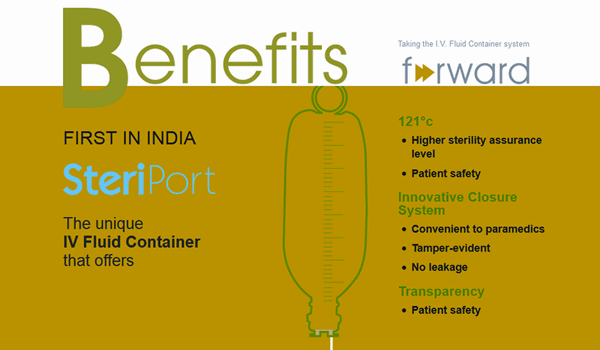‘Over next three to five years, we intend to expand the existing capacities of large and small volume parenterals to meet the expanding demand’
Amanta Healthcare, an Ahmedabad-based, mid-sized pharma company had introduced Steriport – a new generation concept of IV fluid system in India. Bavesh Patel, Managing Director, Amanta Healthcare divulges more information about the company, its offerings, Steriport, its advantages and more, in an exclusive interview with Usha Sharma
What are the solutions you offer to pharma companies?
Amanta is in manufacturing and marketing of sterile dosages. Under product partnering vertical, we cover products in fluid replacement, respiratory and eye care. Apart from manufacturing, we collaborate in product development and process engineering.
The company offers solutions to the critical care segment, tell us more about it?
Being a dedicated manufacturer of sterile dosages especially Fluid Therapy, we automatically find ourselves in critical segment. We have pan India presence apart from numerous export destinations. Fluid Therapy, both, in conventional PE bottles as well as SteriPort offer almost entire range of Fluid Replacement Solution for critical and intensive care. Our additional portfolio in critical care includes fever management (Paracetamol) and anti-infective (Ciprofloxacin, Ofloxacin, Metronidazole, Linezolid) segments. SteriPort is a portfolio enhancer in the critical care segment as it is widely used in intensive care.
Recently, Amanta launched SteriPort-new generation of IV Fluid, how is it different from other IV fluids?
Global guidelines (PIC/s, EP, IP, WHO) for IV Fluid container includes Sterilization at 121 °C, Two-Port Closure system and Transparency for visual inspection. Most of the containers commonly available in Indian Market are made up of Polyethylene (PE) and do not comply with these standards.
SteriPort meets global standards. It has high sterility assurance level (sterilised at 121o C), is as transparent as a glass container and has two port closure systems.
The unique feature of SteriPort is that it is compatible with most of the oncology products for IV administration, which is not the case with polyethylene (PE) bottles.
SteriPort has superior tensile strength, optical property and barrier properties compared to PE containers.
Why should private and government hospitals use SteriPort?
Selection of IV Fluid container is crucial for patient safety. Global guidelines are very specific and emphasise on 121o C, two-port closure system and transparency.
(i) SteriPort is sterilised at 121o C which ensures higher sterility assurance level. PE Containers are sterilised at 108o C.
(ii) SteriPort has two-port closure system which helps in supplemental medication and ensures drug compliance. Most of the commonly used PE containers do not have closure system and tends to leak, compromising on compliance.
(iii) SteriPort is glass-like transparent. Widely used PE containers are translucent which makes visual inspection difficult.
Why do you think that SteriPort is going to be the choice for corporate hospitals?
SteriPort complies with all the international standards for an ideal IV container:
(i) It is sterilised at 121o C which ensures higher sterility assurance level unlike the most commonly used containers in India which are sterilised at 108o C
(ii) Two-port closure system which enables supplemental medication
(iii) Glass like transparency which helps in visual inspection
Tell us about the packaging material of SteriPort and what advanced technologies have you used for it? How user friendly is it?
SteriPort is made of Random Co-Polymer of Poly Propylene (RCPP). This polymer resists temperature up to 125oC, which enables SteriPort to be sterilised at 121oC. It has superior tensile strength, optical and barrier property.
The polymer of RCPP used for manufacturing SteriPort is Drug Master File (DMF) grade material.
SteriPort is an innovative container which is user-friendly for paramedics. It is a combination of unique packaging material (RCPP) and manufacturing process. Amanta is the first in India to launch such an innovative IV container.
Globally, who are your competitors and why?
Competition varies from country to country. Most of the countries like North Europe and North America prefer IV bags and glass bottles. Some countries in Europe, Asia and Africa see overwhelming use of PE bottles. The bottle made of RCPP is relatively new concept. Globally, there are MNCs like Baxter, Otsuka, Fresenius Kabi and B. Braun. There are no of Indian companies who have strong market presence in Asia and Africa.
What makes Steriport a great value proposition?
SteriPort was a new concept when it was launched. The cost of manufacturing is also higher as compared to conventional PE bottles. In the initial phase, the focus was more on establishing the concept and convincing the doctors and paramedics about the benefits. Although the product is little costly, the advantage is in terms of patient’s safety and drug compatibility, which makes SteriPort a great value preposition.
Tell us about the company’s future plans. What are the new technologies/ products that the company is planning to launch? How soon will they be seen in the market?
Over next three to five years, we intend to expand the existing capacities of large and small volume parenterals to meet the expanding demand as well as set up a facility for sterile injections and other dosages form. We also have plans to install glass and bag lines for total parenteral nutrition range of products.
- Advertisement -



Comments are closed.